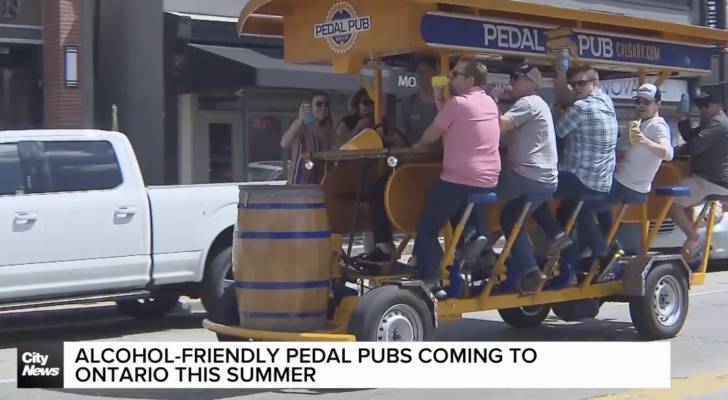
Ontario just gave the green light to a new kind of bar crawl, one that moves on wheels.
As of Canada Day, “pedal pubs” — those multi-person party bikes seen rolling through cities like Toronto and Ottawa — can now legally sell and serve alcohol while on the move. Until now, the rides were strictly booze-free, with drinks only allowed during scheduled stops at bars or breweries.
That changed with new amendments to Ontario’s Liquor Licence and Control Act. The update allows pedal pub operators to apply for mobile liquor licences through the Alcohol and Gaming Commission of Ontario (AGCO), the provincial body that regulates alcohol sales, cannabis, gambling and horse racing. Local municipalities will still have the final say on routes, schedules and safety rules.
The pedal pub concept isn’t new. Ontario launched a dry pilot program back in 2022 in cities like Windsor, Niagara-on-the-Lake and Ottawa. But this latest change could turn them from novelty rides into a rolling part of the province’s tourism economy.
Turning pedals into profits
When Ontario announced it would allow alcohol sales on pedal pubs, the move wasn’t just about fun. It was about fuelling a sector still rebounding from pandemic losses.
“This change will stimulate tourism, bring communities together and protect local jobs,” said Attorney General Doug Downey, pointing to the province’s $32-billion tourism economy, which supports more than 325,000 jobs.
Operators are betting on it. By letting riders sip mid-tour instead of hopping off at bars, pedal pub companies expect longer tours, higher ticket prices and more dollars flowing to nearby restaurants, breweries and shops.
There’s already proof this model works.
In Winnipeg, Pedal Pub ran roughly 500 tours over two years. With about 13 riders on each one, the operator estimates every tour brought in around $1,200 in spending at local businesses — whether it was craft beer, charcuterie or brunch before boarding. That’s over $60,000 a season, all from a single rolling bike.
Ontario’s Large Cycle Association says those kinds of numbers are the norm. In 2022, Pedal Pub Toronto launched with just two bikes and 13 employees. Multiply that across a few more bikes and a summer’s worth of tours, and you’ve got a small but mighty boost to local employment.
It’s not just a party on wheels anymore. It’s a moving piece of the local economy.
Nashville knows the drill
If Ontario wants a preview of how boozy bike bars can play out, it only has to look south.
Nashville embraced pedal taverns years ago, licensing roughly 26 of the rolling group bikes. They quickly became a fixture of the city’s entertainment district, beloved by tourists, especially bachelor and bachelorette parties, and loathed by some locals stuck behind them in traffic.
At their peak, pedal pubs in Nashville were often booked solid during peak travel months. The economic upside was clear: more foot traffic, more drink sales and more bookings for local attractions. But that popularity came with congestion headaches. Reddit threads still document downtown backups and frustration from rideshare drivers and residents alike.
Eventually, Nashville’s licensing board debated whether to cap or scale back permits, citing safety and gridlock concerns. That push and pull between opportunity and oversight offers a valuable lesson for Ontario cities now plotting their own routes.
Before you climb aboard
Ontario’s version of the pedal pub will come with its own set of rules, designed to keep the party rolling safely.
First, you’ll need to be legal drinking age, 19 or older, and carry valid photo ID. Riders typically sign a waiver before boarding, just like at any activity-based attraction.
Despite the drinks flowing onboard, the person steering the vehicle won’t be partaking. All pedal pubs require a trained, sober driver to guide the group, whether it’s navigating Queen St. West or weaving through wine country.
Routes and hours will be set by each municipality, with local councils deciding where the bikes can go and when. That gives cities flexibility to avoid traffic choke points and respond to community concerns.
Behind the scenes, operators will likely need serious insurance. In the U.S., that includes liquor liability, auto coverage and inland marine insurance to cover the bikes themselves. Similar requirements are expected here, and will be key to keeping operators, riders and the public protected.
Serious business
Ontario’s move to legalize alcohol on pedal pubs might seem like a novelty but it’s got serious business potential. Whether it’s winery loops in Niagara or patio crawls in downtown Ottawa, these rolling barstools could open up a fresh revenue stream for the province’s $32-billion tourism sector.
Each tour has the potential to pump more than $1,000 into surrounding businesses. Multiply that by dozens of tours a week, across multiple cities, and the numbers add up quickly.
Still, success won’t come from good vibes alone. It’ll depend on smart licensing, strong safety standards and the ability to learn from cities like Nashville. where too much of a good thing nearly became too much to handle.
If Ontario gets it right, pedal pubs could become more than just a ride. They could be a new chapter in the province’s post-pandemic tourism playbook: Loud, lively and built for the long haul.
Sources
1. CityNews: Ford government to allow alcohol on ‘pedal pubs’ (Juine 27, 2025)
2. Reddit: r/Nashville: Nashville leaders say downtown has enough pedal vehicles, ask for new permits to be denied
This article provides information only and should not be construed as advice. It is provided without warranty of any kind.